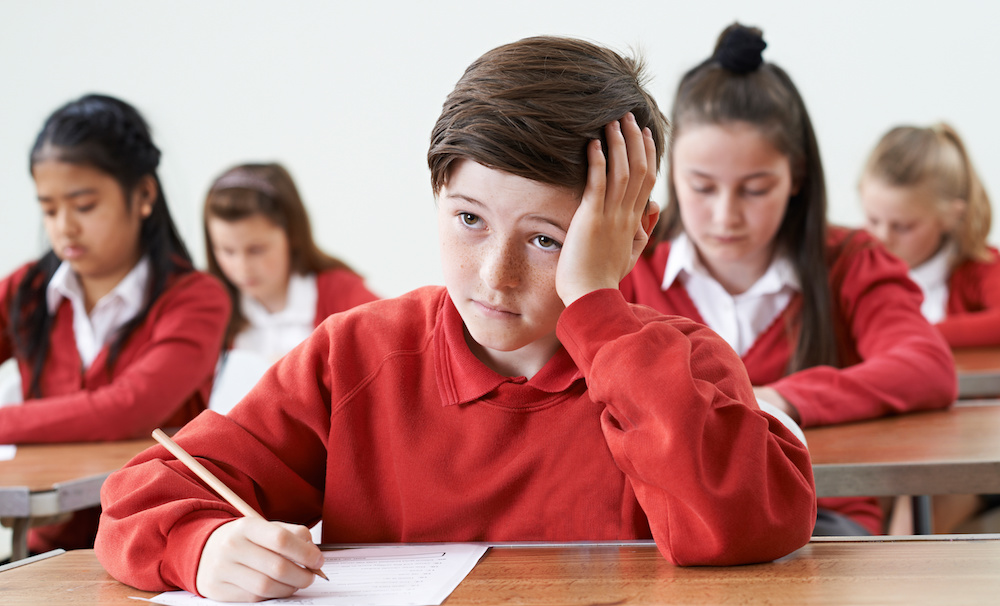Teachers can’t keep pretending everything is OK – toxic positivity will only make them sick
As children return to schools across the country, the outlook for teachers is bleak.

The spread of Omicron will make chronic staff shortages worse and has added to teachers’ responsibilities. They must now be COVID wardens, while supporting the many students whose mental health has suffered during the pandemic – not to mention teachers’ concerns for their own health.
All of this is piling pressure on teachers who already had unmanageable workloads. In a national survey for the 2021 NEiTA-ACE Teachers Report Card, many reported very high workplace stress.
Teachers said their workloads were “massive”. Their work-life balance was “less than ideal or non-existent”. They felt “overworked, burnt out and undervalued”.
Teachers are increasingly dissatisfied with the unreasonable demands created by their work conditions.
A typical week includes piles of marking, planning learning for an increasingly diverse student cohort and responding to parent emails and phone calls, which can take hours.
Administrative and compliance tasks also consume teachers’ time. They must collect, analyse and report on student performance data. They are expected to document all student misbehaviour, welfare and well-being concerns as they struggle to keep their classrooms safe, inclusive and enjoyable places to learn.
Then there are the endless meetings, staff briefings and professional development, while delivering an over-prescriptive and crowded curriculum so students meet national achievement standards.
One teacher in Perth told us:
“The expectations are impossible to live up to. We want to help our students and do all that is asked of us but often I face hostility and distrust from students and their parents or carers.
“After teaching for over 15 years this all has a cumulative effect. I’ve struggled with feelings of disillusionment and burn-out. Sometimes I think that my well-being goes unnoticed or is dismissed as unimportant.”
One of us wrote last year about the emotional labour of teachers who have to manage, suppress or feign their emotions as part of their work. They “put on a brave face” and ignore their emotions to get through the daily ups and downs of school life. But it can be exhausting.
I use to be a Primary School Teacher, but the stress of teaching during COVID is absolute madness, so I needed to take some time out of the classroom 😖😰. Most of the Government Schools in Queensland, Australia never closed, even during peak rates of COVID cases. INSANITY 🤦🏻♀️🤬! pic.twitter.com/mGHMk89Ywg
— Issy King (@IsabellaHope23) January 3, 2021
Many teachers who have since contacted us are sick of pretending they are “doing OK”. They are deeply concerned that school administrators are pushing them to be unrealistically positive, despite evidence to a federal parliamentary inquiry that workloads and stresses are eroding teachers’ well-being across the country.
With tears in her eyes, one very experienced teacher in Canberra described a particularly violent student bullying incident at her school. The police were involved and many staff were traumatised.
However, her school’s leaders required her not to talk about the incident, despite the stress it caused. More than a year later, the staff have had no opportunity to debrief with one another about it.
The teacher said the leaders’ priority was protecting the school’s “brand”, rather than to help staff confront the obvious challenges they faced. They were expected to cultivate a “positive attitude” and “be quiet” about “any negativity”.
What is toxic positivity?
Toxic positivity has emerged as a significant force in the lives of teachers in Australia. Education administrators are reshaping workplace values and practices to maintain employees’ positivity, happiness and optimism in the face of irrefutable evidence that everything is not great.
Positivity in a workplace setting is not inherently toxic to our mental health. However, psychological researchers are calling out the dangers of being persistently optimistic when our experiences are clearly and objectively anything but positive.
This happens in schools when administrators urge teachers to look on the bright side or find the opportunities in challenging work conditions. In doing so, schools sideline the issue of workplace stress by policing negative comments and ignoring difficult issues raised by staff.
Administrators are consumed by the positive spin. They offer staff professional development facilitated by “wellness consultants” who teach self-care strategies, such as doing yoga, to maximise well-being and minimise negativity.
Is this sort of positivity ethical?
In a recent research article, we theorised about the ethics of positivity in education. We criticised the “positive movement”, typified by “happiness scientists” and self-help literature, which purports to make us all “lastingly happy”. We liken this pop psychology to the snake oil charlatans of the past.
We found that during a teacher’s university training positive emotions are seen as a highly productive way to build relationships with students. They are regarded as an important signal that a teacher is being ethical and professional.
Positive emotions can support teaching and learning practices and help teachers maintain their energy. However, we argue when relentless positivity takes hold in schools to deny negative experiences or stressors, there can be unethical and dangerous consequences for teachers. These include demoralisation and emotional fatigue, which contribute to teachers leaving the profession.

We need collective care for a shared problem
Teachers are experiencing what we term “collective emotional labour”. Forces such as the COVID pandemic and chronic staff shortages have put enormous pressure on teachers collectively. This means they need to work on their emotional well-being as a co-operative network, rather than as individuals.
Individual strategies of self-care to support workplace stress are exactly that, an individual concern. When it comes to teachers’ shared concerns, they need meaningful collective strategies of support and care.
School administrators and teachers should come together to put aside the platitudes of “keeping positive”. They need to find space and time to share and respond to their emotional concerns.
Teachers will then feel they are being heard and that their emotions are valid because their school culture is open, understanding and realistic about their experiences and stress. This is by no means the cure-all for the troubles of schools and the profession. But it is an essential starting place in these times of collective uncertainty and stress.![]()







